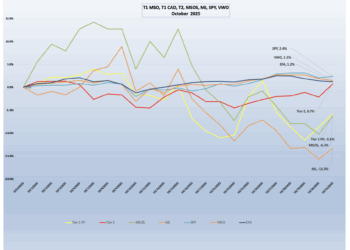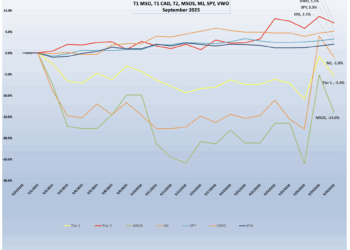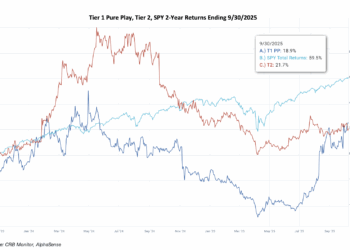Cannabis Equity Returns – The same old song
What a letdown. On April 30, it had been more than 19 months since President Joe Biden injected life (or at least, hope) into the cannabis industry with his passionate appeal for cannabis reform, with particular focus on decriminalization and Drug Enforcement Administration (DEA) rescheduling. And now it has been more than seven months since the infamous leaked memo from the Department of Health and Human Services to the DEA recommending that marijuana be moved down the list from Schedule I to Schedule III.
With the benefit of hindsight, we all know what happened next, and continues to happen (insert clever Lucy/Charlie Brown placekicking scene here). The rescheduling revelations were positive for cannabis equities, if only for the perception of them alone. And then as things tend to happen for this tiny industry, the bottom fell out once again when investors realized that the Emerald City is still a bit too far in the distant future for CRBs to arrive there any time soon. And rescheduling, which was to be, from a tax perspective, a major shot in the arm for most MSOs, would be put on hold for its comment period while Washington goes into election year mode. But we digress.
The Nasdaq CRB Monitor Global Cannabis Index (HERBAL) is a mix of pure play Tier 1 and Tier 2 cannabis related equities, weighted by both investability and strength of theme (SOT). A well-conceived representation of the universe of legal cannabis equities, HERBAL had a -17.1% return for the second quarter of 2024. A full description of HERBAL’s strengths and benefits can be found in our Nasdaq CRB Monitor Global Cannabis Index.
The largest U.S. plant-touching cannabis-themed ETFs, the Amplify Alternative Harvest ETF (NYSE Arca: MJ) (-15.7%) and the MSO-heavy Advisorshares Pure US Cannabis ETF (NYSE: MSOS) (-26.8%), lost even more value in spite of the April 30 surge. Unlike HERBAL, which is designed to be Controlled Substances Act (CSA)-friendly, these two funds with U.S. plant-touching marijuana exposure tend to be more sensitive to the U.S. regulatory rollercoaster, which is covered in this newsletter each month.
In the past couple of years, MJ’s performance has had an increased potential to deviate from HERBAL’s (and other cannabis-themed ETPs) due to its current unconventional composition. Since its origin, MJ has held a significant percentage of non-pure play (and in a few cases, non-CRB) holdings, more specifically tobacco stocks and a few Tier 3 CRBs with either very small or no cannabis exposure at all. Additionally, in 2022 MJ added and maintains close to a 50% U.S. plant-touching component via a holding in its sister fund, MJUS. The plant-touching component also has the potential to impact MJ’s eligibility on investment platforms that restrict U.S. cannabis exposure. It’s also important to note that both MJ and MJUS are now operating under a new issuer, Amplify ETFs.
The CRB Monitor equally weighted basket of the largest Pure Play Tier 1 CRBs struggled in the second quarter, returning -23.8%. This basket is essentially a hybrid of CRBs without U.S. touchpoints (the CAD component) and U.S. multi-state operators (the MSO component). Because the basket is equally weighted, its performance is likely to deviate from published indexes and listed funds, which generally employ some variation of market cap weighting. In the second quarter of 2024, the CAD component outperformed the MSO component, +11% vs. -28%.
The performance of the CRB Monitor equally weighted basket of the largest Tier 2 CRBs was negative but outperformed the Tier 1 basket significantly with a -5.7% return in the second quarter. As we have indicated in the past, pure play Tier 1 and Tier 2 CRBs tend to display high (~0.8) correlation in the long term (see our section on correlation in the CRB Monitor February 2024 newsletter), but their respective performance has a tendency to diverge in the short term, given the occasional lag from the impact (positive or negative) of market forces. In general, Tier 2 CRBs share in the overall success or failure of the Tier 1 universe and ultimately are expected to converge with the Tier 1 equity basket.
US equities held their own in Q2, with the SPDR S&P 500 ETF Trust (NYSE Arca: SPY) returning a respectable +4.0% return. Year-to-date, the S&P 500’s return through June is +15.3%, which annualizes to a return of +33%. The Federal Reserve said all 31 big banks passed their annual stress test, which included a simulation of a 10% U.S. unemployment rate, a 32% decline in housing prices and a 40% drop in commercial real estate. After the end of the second quarter, the banks started to announce their intent to increase their dividends, as well as update their share repurchase program.
Largest Tier 1 Pure Play CRBs & Tier 2 CRBs – 2nd Quarter 2024 Returns
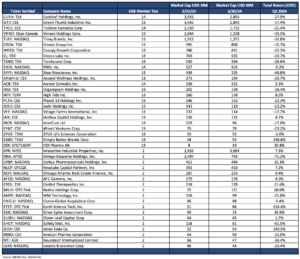
CRB Monitor Tier 1
The table above is all we need to know about this industry, which surged upward for a moment (April 30) and then fell precipitously back to earth for the remainder of the quarter. There are very few bright spots in Tier 1 and a handful in Tier 2; however, the pain is evident across the entire space and comes from both the MSO and Canadian groups.
Over the last few years, cannabis investors have born witness to a near complete stoppage of cannabis-related M&A activity. With that said, we have reported on public CRBs purchasing thousands of private cannabis businesses, and we believe this trend will continue in the months and years to come. But Tier 1 IPO activity and significant mergers and acquisitions have slowed to a crawl as this market has shrunk down to a tiny fraction of its former self.
Within the MSO group, stocks across the board went into a slide following the April month-end spike.
Green Thumb Industries Inc. (CSE: GTII) fell -17.4%. Meanwhile, Cresco Labs Inc. (CSE: CL) (-23.7%), Curaleaf Holdings, Inc. (CSE: CURA) (-27.9%), Verano Holdings Corp. (CSE: VRNO) (-39.5%), and Trulieve Cannabis Corp. (CSE: TRUL) (-25.4%) all reversed their positive YTD returns in spite of a strong start to 2024.
The Canadian (non-U.S. plant-touching) operators were no better off than their MSO counterparts, with Tier 1 Canadian CRBs Tilray Brands, Inc. (Nasdaq: TLRY) (-32.8%), Canopy Growth Corporation (TSX: WEED) (-25.3%), Sundial Growers, now called SNDL, Inc., (Nasdaq: SNDL) (-5.2%) and Cronos Group Inc. (TSX: CRON) (-10.7%) all feeling the sting of inaction from the U.S. government.
CRB Monitor Tier 2
An equally weighted basket of the largest CRB Monitor Tier 2 companies returned a lackluster but less shocking return of -5.7% for the second quarter, which outperformed the equally weighted Tier 1 basket by 9.4%. Pure play Tier 1 and Tier 2 CRBs tend to display high correlation in the long term (see our February 2024 “Chart of the Month”), but their respective performance has a tendency to diverge in the short term, as it did in the first quarter, given the occasional lag from the impact of market forces.
IIPR evades the volatility
Given its relative size and direct relationship to plant-touching cannabis operations, we tend to follow Innovative Industrial Properties, Inc. (NYSE: IIPR) (+7.3%) closely. IIPR is an internally managed real estate investment trust (CRBM sector – REIT) focused on “the acquisition, ownership and management of specialized properties leased to experienced, state-licensed operators for their regulated state-licensed cannabis facilities.” IIPR’s stock price has continued to rise over the last 12 months, maintaining stable earnings throughout that difficult period. IIPR reported its First Quarter Results on May 8, which featured the following highlights:
- “Generated total revenues of $75.5 million and net income attributable to common stockholders of $39.1 million, or $1.36 per share (all per share amounts in this press release are reported on a diluted basis unless otherwise noted).
- Recorded adjusted funds from operations (AFFO) and normalized funds from operations (Normalized FFO) of $63.0 million and $56.4 million, respectively.
- Paid a quarterly dividend of $1.82 per common share on April 15, 2024 to stockholders of record as of March 28, 2024 (an AFFO payout ratio of 82%). The common stock dividends declared for the twelve months ended March 31, 2024 total $7.24 per common share.”
Tier 2 REIT AFC Gamma, Inc. (Nasdaq: AFCG) (CRBM sector – REIT) (+4.3%) finished the quarter higher and outperformed many of its Tier 1 clients. On May 9, AFCG reported its First Quarter 2024 earnings, which featured the following statement from CEO Daniel Neville:
“We are pleased to have originated a total of $90.4 million of loans in the first quarter of 2024, with $34.0 million in loans to cannabis operators and $56.4 million to commercial real estate developers. On the cannabis side, we completed a $34.0 million debt investment in Sunburn Cannabis, a private, vertically integrated single-state Florida operator. The investment underscores our commitment to fostering long-lasting relationships with our borrowers and focusing on limited license states with attractive supply and demand dynamics. Additionally, we are encouraged by the promising legislative developments at both the federal and state level, including the anticipated rescheduling at the federal level and the potential transition to adult-use cannabis in states like Ohio and Florida.”
CRB Monitor Securities Database
As of June 30, 2024, the breakdown of publicly traded, cannabis-linked securities was as follows:
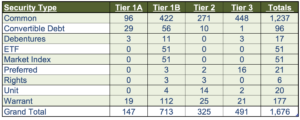
As we have written over the last two years, cannabis M&A activity is largely a thing of the past, and that will be the status quo until we see more action out of the US government. With that said, the CRB Monitor research team operates in a busy daily environment as we build out and maintain, in real time, an accurate record of each CRB’s corporate structure and current security details. We make hundreds of updates to CRB profiles every quarter and second quarter 2024 was no exception. In addition to business expansion and corporate finance, we are tracking daily changes to company identifiers, new security listings, risk tier changes, new additions, possible removals, and updates to company officers and directors.
CRB Monitor News-Related Securities Database Updates – Q2 2024
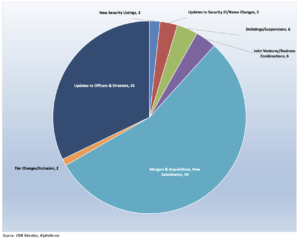
Cannabis Business Transaction News
Of the thousands of announcements and filings reviewed during the full year, our daily research resulted in a total of 394 updates to CRB Monitor company profiles (171 updates to issuers’ records, 223 news articles added). The complete list of securities and detailed profiles for nearly 1,300 cannabis-linked issuers can be found in the CRB Monitor database. For more detail on our updates to the CRB Monitor database, please refer to our latest monthly newsletters for April, May and June.
The following is a sampling of some of the highlights from the second quarter 2024 cannabis news cycle:
First, in April: Tier 1A Flora Growth Corp. (NASDAQ: FLGC) announced in an April 1 press release that it “has entered into a binding Letter of Intent to acquire TruHC pharma GmbH in an all-stock deal in exchange for 2,770,562 Flora common shares, valued at $6.4 million based on the closing price of the Flora Growth shares on March 28, 2024 of $2.31 per share. The first tranche of transaction is expected to close in the second quarter of 2024. Flora’s wholly-owned subsidiaries have been active in Germany since 2017, obtained the first medical cannabis license in Germany and are responsible for selling the first gram of medical cannabis in the country. With its acquisition of TruHC, Flora cements its position at the forefront of this historic German and European cannabis opportunity.”
Following this M&A deal, Flora Growth’s global license footprint consists of eight cannabis licenses representing operations in five countries (Germany, Switzerland, Portugal, Colombia and Denmark). The press release goes on to say, “The acquisition brings an already successful partnership between Flora and TruHC under the Flora brand, providing the potential to unlock greater economic value from future distribution in Germany and Europe.”
Vext is in the news again: Tier 1B MSO Vext Science, Inc. (CSE: VEXT) issued a press release on April 8 announcing it “has completed the acquisition of real property associated with a cannabis dispensary in Athens, Ohio as part of the previously disclosed Ohio Expansion Transaction. As consideration for the Property Acquisition, the Company has paid aggregate consideration of $2.6 million, consisting of $0.9 million in cash and the issuance of a promissory note in the principal amount of $1.7 million.”
With this new acquisition, Vext’s active license count is now 14 with operations in Ohio, Arizona and Oklahoma.
Tier 1A MSO Curaleaf Holdings, Inc. (CSE: CURA) issued a press release on April 22 announcing “the closing of its acquisition of Northern Green Canada (“NGC”), a vertically integrated Canadian licensed cannabis producer focused primarily on expanding in the international market through its EU-GMP certification. The accretive acquisition amplifies the Company’s strategic advantage in established European markets including Germany, Poland and the United Kingdom and provides a foothold in the emerging markets of Australia and New Zealand.”
The announcement goes on to say, “Integrating NGC’s international operation will equip Curaleaf with a secure and consistent high quality, non-irradiated, indoor EU-GMP flower supply, essential to maintaining its leading positions in Germany, the United Kingdom and Poland. … Terms of the acquisition of NGC include an initial payment at closing of the Company’s Subordinate Voting Shares valued at approximately US $16 million, subject to a typical post-closing adjustment. An earnout may also be paid in 2025 based upon 2024 performance of NGC’s operations, up to 50% of which will be cash and the rest paid in additional Subordinate Voting Shares. The issuance of Subordinate Voting Shares in connection with the acquisition of NGC has been conditionally approved by the Toronto Stock Exchange, subject to fulfilling customary listing conditions.”
Curaleaf holds, directly and through its subsidiary businesses, 135 cannabis licenses (that are either active or pending approval) and operates in six countries.
In May, seemingly always in expansion mode, Verano Holdings Corp. (CSE: VRNO) issued a press release on May 2 announcing the grand opening of Zen Leaf Naugatuck, the Company’s third social equity joint venture location in Connecticut and fifth cannabis dispensary statewide. In the spirit of doing good while doing well, the announcement highlights some aspects of this socially responsible business:
“In opening Zen Leaf Naugatuck, Verano received support for the Company’s approved social equity plan from several local community organizations, including the Brass City Gamers Tournament, Rivera Memorial Foundation, The UnGroup Society and the Waterbury Opportunities Industrialization Center Inc. Through these community partnerships, Zen Leaf will directly fund area youth education initiatives, including: LifeLaunch Waterbury: an innovative 12-week e-learning curriculum for teens and young adults in Waterbury that teaches a broad range of life skills and financial literacy. STEM Training and Laptop Donations: in partnership with Waterbury-based Brass City Gamers, Zen Leaf will sponsor an 8-week STEM certified course and provide the first 10 graduates of the program with new Acer coding laptops, enabling local youth to continue pursuing STEM education goals.”
Verano currently holds 82 cannabis licenses that are either active or pending approval, and they operate in 13 states plus the District of Columbia.
In a forward-looking move, Tier 1B Tilray Brands, Inc. (Nasdaq: TLRY) announced on May 17 that it has “filed a prospectus supplement with the U.S. Securities and Exchange Commission, under which it may offer and sell shares of its common stock having an aggregate offering value of up to $250 million from time to time through an at-the-market equity program.” The Company has entered into an equity distribution agreement with TD Securities LLC and Jefferies LLC. “Pursuant to the equity distribution agreement, TD Securities and Jefferies may sell the Company’s Common Stock in transactions that are deemed an “at-the-market offering” defined in Rule 415 under the Securities Act of 1933, as amended, including sales made directly on or through the Nasdaq Global Select Market. The timing and amount of any such sales will be determined by a variety of factors considered by the Company. Sales may be made at market prices prevailing at the time of a sale or at prices related to prevailing market prices.”
Why are they doing this? In the words of the announcement, “The Company currently intends to use the net proceeds from the ATM Program, if any, to fund strategic and accretive acquisitions or investments in businesses, including potential acquisitions of assets in the U.S. and internationally in order to capitalize on expected regulatory advancements or expansion opportunities. The Company does not currently intend to use the net proceeds from the ATM Program for general working capital purposes.”
Tilray currently operates in 10 countries (not the U.S.) and holds 356 cannabis licenses that are either active or pending approval.
In June, Tier 1A MSO Trulieve Cannabis Corp. (CSE: TRUL) announced June 3 the opening of its 200th U.S. dispensary in Brooksville, Fla. According to the press release, “Trulieve Brooksville Broad Street will carry a wide variety of popular products including Trulieve’s portfolio of in-house brands such as Alchemy, Co2lors, Cultivar Collection, Modern Flower, Momenta, Muse, Roll One, Sweet Talk, and Trekkers. Customers will also have access to beloved partner brands such as Alien Labs, Bellamy Brothers, Binske, Black Tuna, Blue River, Connected Cannabis, DeLisioso, Khalifa Kush, Love’s Oven, Miami Mango, O.pen, Seed Junky, and Sunshine Cannabis, all available exclusively at Trulieve in Florida.”
With this new medical dispensary, Trulieve now operates in 19 states and holds 129 licenses in either active status or pending approval.
Finally, legendary Canadian Tier 1B CRB Canopy Growth Corporation (TSX: WEED) made news with the June 4 announcement that “the option to acquire all of the issued and outstanding Class E subordinate voting shares of Acreage Holdings has been exercised per the terms of the arrangement agreement between Canopy Growth and Acreage. In connection with the arrangement agreement dated October 24, 2022, Canopy U.S.A. will acquire all of the fixed shares and floating shares and Acreage will become a wholly-owned subsidiary of Canopy U.S.A. In addition, Canopy announced that it exercised its option, in part, to acquire certain outstanding debt of Acreage in connection with the option agreement dated November 15, 2022, among a wholly-owned subsidiary of Canopy and the lenders’ party to Acreage’s credit agreement dated as of December 2021, as amended on October 24, 2022, and April 28, 2023,” according to the press release.
So, does this exercise now make Canopy Growth a U.S. marijuana business, and if so, why are the TSX and Nasdaq still allowing it to list? That is an excellent question, because when these options were originally issued, the assumption was that Canopy Growth would only exercise them and take ownership of Acreage when the U.S. legalized marijuana (a nice summary is presented in this article from The Street). This saga has been evolving since shortly after the deal was struck. A press release from September 2020 announced an amendment to the original agreement, which altered the terms but still keeps things legal under U.S. federal statute.
Now fast forward to June 2024, and Canopy Growth announced that it has exercised the options, but the transaction is not executed by the parent company (which would be in violation of the CSA), but rather by Canopy USA, a private holding company with an arm’s length relationship to Canopy Growth Corp. Therefore for institutional compliance officers who might be concerned about this from a CSA-restriction perspective, we are happy to discuss the particulars because there is no right answer to this one.
Regulatory Updates
First, in April the CRB Monitor News team seized on this story out of the state of Missouri. In their article, Missouri Revokes Nine of 48 Social Equity Microbusiness Licenses, our team reported that “Nine of the 48 social equity cannabis licenses that Missouri dished out last fall have been revoked following claims that out-of-state actors were improperly backing local social equity candidates. Eight of those licenses did not meet ownership rules for microbusinesses.”
In an apparent blow to the social equity cannabis program in the state, Missouri cited several reasons for the revocations. In the words of the article, “In a March 27 statement, the Missouri Department of Health and Human Services said the purported majority owners had ‘limited to no knowledge or understanding of agreements or operations.’ In some cases, the social equity owner did not even know the person who applied for the license on their behalf. ‘While owning and operating a license may include contracting for management services or consulting services, the lack of knowledge, control, agency or decision-making demonstrated by the individuals whose information was used to meet eligibility does not meet even the most generous interpretation of owning and operating a business,’ said Amy Moore, director of the Division of Cannabis Regulation in the statement.”
Next, in May, a number of excellent accounts of the recent developments in rescheduling have been published by our very own CRB Monitor News team, and one of these in May entitled “Rescheduling Cannabis: Formal Rulemaking Process Can Drag On for Years” highlights the reasons why cannabis operators should not be opening their celebratory champagne any time soon. Unfortunately for investors and operators alike, the complexities related to DEA rescheduling, particularly for a drug as controversial as marijuana, will likely make this process a long and painful one.
For anyone that is the least bit optimistic about rescheduling, we suggest they read this article. In the words of our CRB Monitor reporter, “Optimists believe that given President Joe Biden’s political motivation to get this done quickly, we may actually have a final rule before the election. The fact that Attorney General Merrick Garland signed and submitted the proposed rule himself, apparently without DEA leadership support, is a strong sign of that. However, past scheduling efforts through what is known as a “formal rulemaking process” signal otherwise. Expected legal challenges in what has historically been a long process could drag this out until next year at the soonest, possibly years.”
Also in May, our CRB Monitor News Team published a story that reported that Illinois “awarded about three dozen new social equity dispensary conditional licenses in the state’s second round of social equity lottery licensing since the state legislature legalized adult-use cannabis in 2020.”
This is excellent news for the community at large, as the original issuance of cannabis licenses across the U.S. up to around 2020 seemed to ignore the concept of social equity. The article continues, “The Illinois Department of Financial and Professional Regulation which oversees the state’s legal cannabis market, approved 35 new social equity dispensary licenses on May 3. The conditional licenses grant awardees a year to build out their operations and gain local approval. The department said it expects to issue 13 more conditional licenses in the near future. Illinois currently has 202 adult-use dispensaries in operation, of which 92 qualify for social equity status, according to a press release. Another 108 social equity conditional licenses awarded in 2022 are still not open for business.”
Finally, in June, some somber news out of the Granite State: In an article published in MJ Biz Daily, once again New Hampshire continues to be the only state in New England “without a regulated adult-use cannabis program after state lawmakers refused to compromise on a controversial legalization bill.”
Those of us close to the cannabis biz tend to scratch our heads when a state that generally leans left struggles to get recreational cannabis over the finish line. In the words of the article, “As expected, Republican Gov. Chris Sununu’s vision for a unique state-run sales model – 14 government-owned marijuana stores throughout the state – failed 178-173 with lawmakers in the libertarian-leaning state House of Representatives, the Associated Press reported.”
The effort to legalize adult-use marijuana in New Hampshire is unique, as the governor’s plan provides very little opportunity for business owners to participate, which is a parallel with the state-run liquor industry. The article goes on to report, “According to the Associated Press, Democratic state Rep. Jared Sullivan called Sununu’s marijuana legalization idea ‘the most intrusive, big-government marijuana program proposed anywhere in the country, one that ignores free-market principles, will stifle innovation in an emerging industry and tie future generations of Granite Staters to an inferior model indefinitely.’”
Wondering what a Tier 1, Tier 2 or Tier 3 CRB is?
See our seminal ACAMS Today white paper Defining “Marijuana-Related Business” and its update, Defining “Cannabis-Related Business.”
The CRB Monitor Securities Research team covers all aspects of the publicly traded, and much of the privately-held, cannabis ecosystem, including the regulatory environment, operational expansion/M&A activity, updates on officers/directors, and investment performance. Additionally, over the last two years, we have developed our research platform for businesses operating in the digital asset space.
With our monthly and quarterly newsletters, we keep our readership informed while we highlight the multi-faceted importance of CRB Monitor’s data to all types of users at financial institutions worldwide.
For additional detail on our updates to the CRB Monitor database, please refer to our monthly newsletters: the CRB Monitor April 2024 newsletter, CRB Monitor May 2024 newsletter, and the CRB Monitor June 2024 newsletter.




